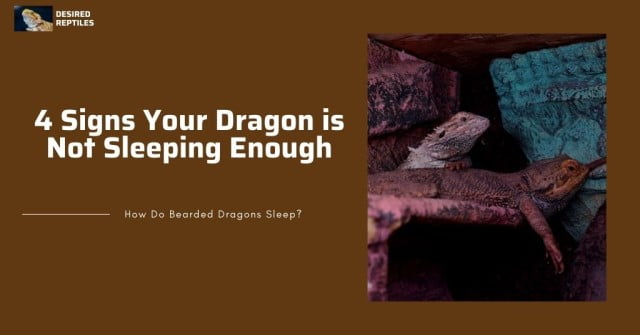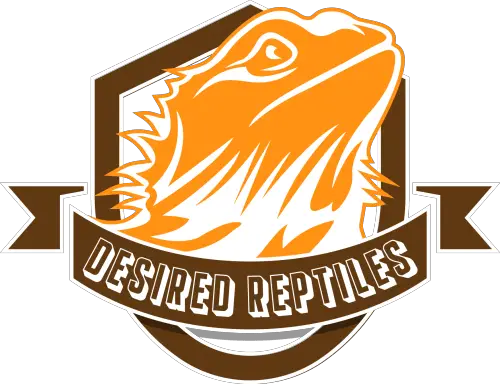Unlike humans, beardies have a much more direct approach to sleep. There’s no tossing and turning or neglecting bedtime for work or leisure. When it’s time to sleep, a bearded dragon will go to bed in a blink without a single thought process. Have you ever wondered how your beardie sleeps at night? Do they need a blanket or a lullaby? Well, it’s very normal to ask those questions, and even better to seek answers.
Bearded dragons pretty much sleep as every wild animal does. They would first need a safe spot to hide them from the jaws of predators and a fairly warm spot to help them preserve their body heat till dawn. Like us, they’re not nocturnal creatures; they’d rather do all their business during the day and sleep at night!
This discussion will enlighten you on the sleep patterns of your bearded dragon so that you have a well-rounded idea of how your pet sleeps at night.
How Do Beardies Sleep? – Positions, Spots, & Duration
Bearded dragons enjoy sleep as much as they enjoy their daily activities, which honestly, isn’t so much. Here are the very simple ways bearded dragons sleep, both during the day and at night:
In Different Positions
If you have a bearded dragon, you may have been creeped out by the weird positions your dragon decides to snooze in. It’s pretty normal for beardies to sleep on their backs, sides, standing, and hanging on logs in awkward postures. Remember that “power nap” you’d take in rather uncomfortable positions like resting your head on a desk? You beardie can take one too– it would prop its head up, arms outstretched, and take a little nap. You may even have a hard time wondering if it’s awake or not.
In The Comfiest Nooks And Crannies
Beardies love to sleep where it’s safe and warm. In the wild, they can sleep in trees or underneath the sand depending on how safe they feel or how warm their environment is. If the weather is warm enough, you may find them in trees or on top of rocks and if they feel a little cold, they’d dig up a shallow pit and bury themselves in the warm sand.
Bearded dragons in captivity are a slightly different case; they may prefer to sleep in different spots of their tank since they feel safe most of the time, and the heat is just right for them. Your beardie may enjoy sleeping under its hut, in its blanket (view on Amazon), on the log, on its hammock (view on Amazon), or plainly on the floor. As long as it’s healthy, every spot is okay!
Beardies Sleep For 12 Hours A Day
Out of the 24 hours a full day brings, your dragon may prefer to sleep for half of it. Bearded dragons are diurnal creatures, so they take naps during the day and rest fully at night. Once the sun starts to set, they sleep to preserve their energy until sunrise when they can come out to play. Once the UVB light is turned off, your beardie is off to dreamland.

4 Easy Ways To Make Your Dragon Sleep Better
Your beardie could be in danger if it’s not sleeping properly. It could be using up too much energy resulting in being lethargic during the day, stressed, and anxious in its environment. Your pet must have a good sleeping environment, and here are 4 ways you can ensure that:
1. Make Sure There’s A Steady Light On/ Light Out Cycle
Bearded dragons need to have healthy formalities that they can adjust to so that they don’t feel stressed. They are highly sensitive to change and require a correct method to tell night from day.
The recommended cycle should be between 12 – 14 hours during the day and 10 – 12 hours at night – preferably 7 am to 7 pm. This is so that the natural sunlight can seep in before your beardie’s light is turned on, and the natural darkness can permeate the tank before you completely plunge them into darkness. It helps your beardie to adjust to the complete differences between night and day just as it would in its natural habitat.
2. Provide Comfy Safe Spots For Your Bearded Dragon
Most of the time, bearded dragons like to hide away when they sleep. A hut or a caved space is essential for ensuring your beardie has a good rest (view on Amazon); you need to provide these items so that your pet does not feel stressed. It’s important for your bearded dragon to associate its home with safety and comfort, or else it would have negative effects on its behavior and health. It’s quite similar to living inside a home with no doors. Could you imagine?
3. The Correct Temperature Must Be Applied
Setting the temperature right is important for ensuring your bearded dragon has a good sleeping pattern. If the terrarium is too cold, your pet could fall sick from respiratory or digestive problems. They need the heat to keep their lungs safe from infections and as well help them rest properly. The temperature in the terrarium should be 104° to 107° Fahrenheit during the day and 75° to 77° during the night. A thermometer (view on Amazon) should be on standby at all times to ensure you keep track of the temperature daily.
4. Feed Your Beardie A Healthy Diet
How healthy your beardie is depended mostly on how healthy its diet is. For everything to function properly, even your pet’s sleeping pattern is a direct result of their health. Ensure that your beardie is eating the correct amount of protein and minerals so that it stays healthy through and through.
Here is a table showing the correct diet for your beardie depending on its age:
| Age (months) | Fraction in Percent (Bugs & Veggies) | Number of Insects |
|---|---|---|
| 0 – 2 (Baby stage) | 70/30 | 25 – 50/day |
| 3 – 6 (Juvenile stage) | 70/30 | 25 – 50/day |
| 6 to 9 (Pre-Adult) | 60/40 | 20/day |
| 18+ (Adult) | 30/70 | 10/day |
Why Does My Beardie Have Difficulty Sleeping?
If your dragon is not sleeping, it could be due to an ongoing illness. Here are some problems that could deprive your pet of sleeping well:
Your Beardie May Be Impacted
Bloating or constipation is very uncomfortable to deal with. Check out your beardie’s belly area; if it looks unnecessarily full and feels hard to the touch, it could be the reason why your pet is tossing and turning.
Perhaps It’s The Metabolic Bone Disease
MBD is a painful and discomforting illness for any beardie to deal with. It disrupts them from finding a comfortable position to sleep in and generally interrupts their sleep. If your beardie is ill with metabolic bone disease, it could be the reason why it doesn’t sleep so well. Consult your vet for better insight on this immediately.
Your Dragon Could Have A Respiratory Disease
Have you ever tried to sleep with a stuffy nose? It’s highly irritating and uncomfortable, and your beardie thinks so too. If there is an underlying respiratory issue, it could easily interrupt your pet’s sleep.

4 Striking Signs Your Beardie Is Not Getting Enough Sleep
You can easily tell if your beardie isn’t sleeping well. It’s almost the same way you would seem with a lack of sleep. Here are complementary tell-tale signs that prove your beardie is sleeping rather badly:
1. Lethargy
A lethargic bearded dragon will be more unresponsive and inactive compared to a healthy beardie. If you discover a decrease in energy in your pet, it’s probably lethargic from the lack of sleep.
2. Loss Of Appetite
A lethargic dragon will most likely be uninterested in eating. If you notice a change in behavior toward food, it can be associated with rest, or rather, the lack thereof.
3. Aggression
Irritability is also a good sign of lack of sleep. A beardie that has a bad sleeping pattern will surely be grumpier and more aggressive than usual. Hissing, blackening the beard, and stress marks are all good signs of aggression in bearded dragons.
4. Eye Problems
An eye disease could develop from a lack of rest. If your beardie is secreting discharge from the eyes or you notice unusual redness or swelling, it could be that it needs more sleep.
Do Bearded Dragons Snore?
Bearded dragons do not snore. If your beardie is making a sound when it’s sleeping, it is probably due to a respiratory disease and should be taken to the vet immediately. Here are other symptoms of respiratory disease in bearded dragons:
- Lethargy
- Heavy breathing
- Pointing of the nose upward
- Discharge from the nose
- Loss of appetite
- Dehydration
- Weight loss
Do Bearded Dragons Dream?
Whether or not bearded dragons dream is highly debatable, and there isn’t a scientific fact to prove that they do. However, just like us, beardies experience rapid eye movement (REM) sleep that may or may not be associated with dreams. They may twitch and move in their sleep, but it’s not exactly associated with dreaming.
